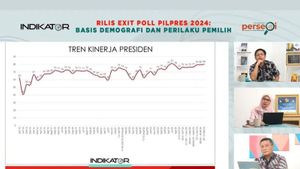JAKARTA - Researcher for the Main Expert of the BRIN Center for Climate and Atmospheric Research, Eddy Hermawan, stated that the day without a shadow that occurred would not trigger hot weather because now Indonesia is in the wet season which makes the clouds still blanket the sky.
"Although the sun is perpendicular, if there are clouds of temperature, it is not too hot," he said as quoted by ANTARA, Thursday, February 22.
Shadowless day is a phenomenon when the Sun is in the highest position in the sky. When the declination of the Sun is equal to the latitude of the observer, the phenomenon is referred to as the main culmination.
Indonesia's position in the equator, then Indonesia's main culmination occurs twice a year and the time is not far from when the Sun is at the equator.
In other cities, the main culmination occurs when the declination of the Sun is the same as the latitude of the city. Especially for the city of Jakarta, the phenomenon occurred on March 4, 2024, whose main culmination occurred at 12.04 WIB, and on October 8, 2024, the main culmination occurred at 11.40 WIB.
Matahari akan berada tepat di garis Lintang equatori 0 derajat pada 21 Maret 2024.
Based on BMKG data, the territory of Indonesia which is now experiencing a shadowless day is in East Nusa Tenggara.
SEE ALSO:
He explained, on the island of Java, areas that have the potential to be affected by the increase in air temperature during the phenomenon of a day without a shadow are the North Coast of Java, especially Jakarta, Semarang, Pekalongan, to Pemalang.
The northern air temperature is around 29, 30, and 31 degrees Celsius. Meanwhile in Bandung it is around 27, 28, and a maximum of 29 degrees Celsius.
"Isn't it hot? Actually it's hot, but there are still many clouds. So, the clouds protect. Don't imagine that Indonesia is like in the Middle East where there are no clouds," concluded Eddy.
Eddy revealed that the apparent movement of the sun as it goes to the equator line will also not cause heat waves or heat waves.
Heat waves usually occur in June, July, and August when Indonesia experiences the dry season. At that time the sea and land would absorb the sun's heat optimally because the sky was not protected by clouds.
The English, Chinese, Japanese, Arabic, and French versions are automatically generated by the AI. So there may still be inaccuracies in translating, please always see Indonesian as our main language. (system supported by DigitalSiber.id)

















